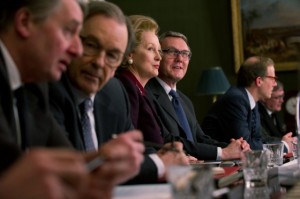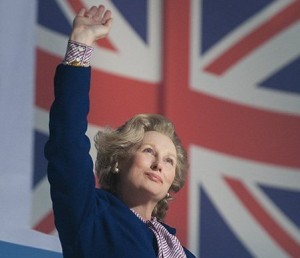
Make no mistake: This is a two-and-a-half-star movie raised to four-star status solely on the performances of Meryl Streep and Jim Broadbent. They make The Iron Lady worth a look, even though the movie itself—to put it kindly—is nothing special. The filmmaker—and more than a few critics—think this reinvents the biopic by structuring the movie in flashbacks built around a frame story of the aged Margaret Thatcher as she sinks into senile dementia. That this is considered any kind of new approach would come as a shock to such filmmakers as Ken Russell, Karel Reisz and even Milos Forman—all of whom used some version of it quite a while back. For that matter, even Irwin Winkler’s Cole Porter movie De-Lovely (2004) used the same technique, albeit in a much more striking way. I have nothing againt The Iron Lady‘s attempt, but it’s hardly revolutionary.

What we end up with here is a messy—even sloppy—movie. (Uncorrected flat TV footage is often just squashed and distorted to fit the film’s Panavision frame—something that is particularly cheesy when intercut as taking place within a scene.) The worst of it is that the film tries desperately not to take sides—concentrating more on the personal Thatcher—and inevitably comes across as a weird Valentine to one of the most polarizing figures of the 20th century. And yet it can’t get away from portraying her sheer arrogance, which in turn makes you wonder why anyone should want to create such a Valentine in the first place. Similarly, the film is completely at a loss to give us any good reason—apart from her grocer’s-daughter background affording some intimation that knowing household accounts is a qualification—why she should ever have been prime minister. Her entire political existence is largely relegated to hard-nosed bitch soundbites and slogans. I may not have liked Thatcher, but there had to be more to her career than this.

But all the same, the film is worth seeing for Streep’s performance, which only occasionally feels like someone doing a Thatcher impression. The old-age scenes are the standouts. It’s not so much the old-age make-up or her uncertain walk or even her occasional shakiness—though all these things are nailed and come into play. It’s more the way Streep uses her eyes to convey both her innate shrewdness and her fear that she’s losing touch with reality. Long before the film affords her two showy freak-outs over the fact that she keeps hallucinating that Denis Thatcher (Broadbent) is still alive, Streep has effectively conveyed her fear that he “is” there and that he isn’t. For moments like this, The Iron Lady is worth seeing. Rated PG-13 for some violent images and brief nudity.




How big is Clark Gregg’s role this time around? Is it more or a cameo or does he have a decent part? I really just want to know if I have to see this for THE AVENGERS to make sense.
Yes. Yes, you do.
It’s funny that people thought that Phyllida Lloyd was an odd choice to helm this. After all, she’s already made one film about a grating relic of the 1970s and 80s.
Even though I think Mamma Mia! was pretty bad — though in a mesmerizing way (I was still working in a theater at the time and I kept watching!) — on the whole I’ll take ABBA over Thatcher. (Actually, I like ABBA just fine in, say, the context of The Adventures of Priscilla, Queen of the Desert.)
Rarely I’ve seen meryl streep working with high profile directors, you think she does a better work than michelle williams’s portrayal as monroe?
The short answer is simply no, I do not. I do think, however, that it may be seen as such because it’s aligned to a more “serious” movie and it’s more “actorly.” It is a good performance, but it’s not in a terribly good movie. Streep occasionally works with strong directors — in recent years there’ve been Daldry, Altman and Demme, at least (don’t know if being in Fantastic Mr. Fox qualifies Anderson) — but it seems she’s more comfortable with ones who are less known for a specific vision.